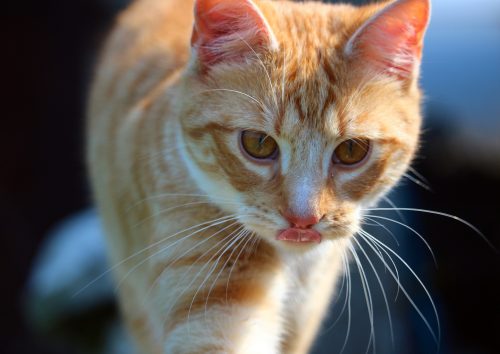It is completely normal for cats to vomit every once in a while. Just like with humans, cats can get an upset stomach or eat something that didn’t agree with them, causing them to get sick. Depending on the underlying cause of their illness, most of the time all a cat needs is 24 hours to be as good as new. If your cat vomits once and seems to be fine a few hours later, do not feel the need to take him to the vet.
However, with that being said, there are a few other symptoms that when combined with vomiting should raise significant concern. One of them is when a cat is vomiting blood. Not only is this frightening to watch, but it’s also a serious situation that needs to be handled immediately. If your cat is vomiting blood, this could mean that he is suffering from a life-threatening health condition that has yet to be treated.
Vomiting of blood, or hematemesis, is normally a sign of a gastrointestinal disorder or some other form of bleeding. Professionals recommend getting your cat to the vet as soon as possible, especially if their vomiting becomes persistent. The blood in the cat’s vomit can either be bright red and streaky or dark in color, similar to coffee grounds. No matter what type your cat has, it is always necessary to seek help from a veterinarian.
Since there are many different causes of vomiting blood, it is important to uncover the source of the problem as soon as possible. By taking your cat to the vet for a thorough examination, they will be able to run a series of tests to identify the issue. If you see your cat throwing up blood, do not wait to seek professional assistance.
This article will review all the main causes of vomiting blood and what you can do as their owner to help your furry companion. As long as you are an informed pet owner you will be able to help your cat in a time of need and may even save his life. The sooner you are able to get your cat to the veterinarian, the faster he will be able to seek treatment and recovery.
Symptoms of Vomiting Blood in Cats
When analyzing the two different types of blood in a cat’s vomit, if the blood is bright red and streaky that usually means damage has been done to the esophagus. This can be caused by an external trauma, swallowing a foreign object, or inflammation. If the cat’s vomit has dark blood that resembles coffee grounds, that could be from issues within the digestive tract. Regardless, both types of problems deem a trip to the veterinarian, especially if other symptoms are present.
Symptoms to keep an eye out for include:
- Lethargy and weakness
- Difficulty breathing
- Shallow breathing
- Diarrhea
- Loss of appetite
- Pain
- Fever
- Black stool
None of these symptoms above should be taken lightly. If your cat has bloody vomit and any of these other problems above, your vet needs to be notified as soon as possible.
Causes of Vomiting Blood in Cats
If a cat is suffering from an ulcer in the gastrointestinal tract or esophagus, there is a high chance that they will be vomiting blood. These open sores form on the mucous membranes of the stomach and small intestines. Ulcers are commonly caused by a bacterial infection within the cat’s gastric system.
If a cat is suffering from this type of problem, other symptoms that may also be present can include loss of appetite, pale gums, lethargy, dark stool, bloody diarrhea, and persistent vomiting. If these symptoms are present in your cat, take them to the vet as soon as possible. From there, your vet will be able to recommend a catered treatment plan that’s specific to your cat’s needs.
Gingivitis
Also known as the earliest stage of periodontal disease, gingivitis is caused by inflammation of the gums. When this condition begins to form, an animal will experience a swelling of the gums, have inflammation of the gingival blood vessels, and will suffer a loss of collagen within the gums itself. For your cat to be diagnosed, your vet will have to put them under while they do a complete dental examination. Since this condition is not life-threatening, all your cat will need is some daily brushing and better oral hygiene. Your vet will be able to provide you with easy tips to follow in order to maintain good oral health for your furry feline.
Hemophilia
Hemophilia is a rare blood disorder that restricts the blood from clotting properly. Other symptoms that are common to this condition include excessive bleeding, prolonged bleeding after surgery, blood loss, or internal bleeding. If any of these symptoms occur, your cat will need to see your vet right away. They will first begin the diagnosis process by running a series of blood test to study their overall health. In severe cases where your cat has lost a substantial amount of blood, they may need to be hospitalized and given blood and plasma transfusions.
Ingesting Rat Poison
If your cat likes to play outdoors and hunt in their free time than they are at a higher risk of consuming rat poison. While ingesting the poison directly causes havoc on its own, a cat can also become ill just by eating a rodent that has consumed the poison as well. The ingredients found in these products can be extremely harmful to our feline companions, which is why they should never be used in areas around your home in the presence of pets or children.
Depending on the type of poison that has been consumed, a cat may experience a wide range of accompanying symptoms including vomiting, difficulty breathing, excessive bleeding, lack of appetite, lethargy, and excessive thirst. If you believe your cat has ingested rat poison, collect a small amount of their vomit and take it to the veterinarian for further studies. Your vet may also run blood and urine test to complete their diagnosis. Depending on the severity of the issue, your vet will then start the treatment process.
Foreign Bodies
As we have previously stated earlier in this article, a cat may begin to vomit blood if they have swallowed a foreign object. Whether it be a bone or toy, these small objects can cut or damage areas of the esophagus or other parts of the gastrointestinal tract. These objects can also cause an obstruction, which will require immediate attention from a veterinarian. If your cat appears to be in pain, has blood in their vomit or stool, or has a loss of appetite, this could mean that they have ingested something they shouldn’t have.
Inflammatory Bowel Disease

Inflammatory bowel disease (IBD) is a condition that affects the gastrointestinal system. Although there is no single known cause of IBD in cats, many professionals believe this disease is caused by food allergies or hypersensitivity to bacteria. Other symptoms that are commonly linked to IBD besides vomiting blood include diarrhea, weight loss, fatigue, depression, gas, and abdominal pains. If you think your cat has IBD, take them to the vet for further testing. Although there is no cure for this problem, there are several antibiotics that can help to mitigate the issue and symptoms.
Heartworm Disease
Heartworm disease is caused by an infestation of a parasitic nematode, also known as Dirofilaria immitis. The severity of heartworm itself will depend on how many worms are present within the body and how the cat’s system responds to the infestation. In most cases, cats who contracted heartworm disease have not had the proper vaccinations before coming into contact with an infected source. Cats who have this condition are known to have a number of symptoms including vomiting, raspy coughing, weight loss, and lack of appetite. As of right now, there is no medication to treat heartworm in cats. If the case is severe, vets may recommend removing the heartworms through a surgical procedure.
Mast Cell Tumors
Mast cell tumors or mastocytoma is one of the many issues that can cause vomiting blood in cats. In a healthy cat, mast cells are white blood cells that are apart of the immune system. Tumors can form in these cells and cause bumps underneath or on the surface of a cat’s skin. Depending on the tumor, it can either be cancerous or benign. In later stages of the disease, vomiting, diarrhea, and loss of appetite can occur. If you notice that your cat has a bump on his skin, it’s always advised to get it checked out by a professional. Your vet will then analyze the tumor and see what the best treatment option should be. In most cases, the vet will usually recommend removing the mass.
What to Do If Your Cat if Vomiting Blood
Just to reiterate this point one more time, if your cat is vomiting blood, take him to the veterinarian as soon as possible. Depending on how fast he is losing blood and how much he is vomiting, he could need medical attention right away, especially if they have ingested rat poison or have swallowed a foreign object. As soon as you get to the veterinarian, they are going to want a complete history of all prior symptoms your cat has been experiencing within the past couple of months. If you have noticed that your cat has been lethargic or doesn’t eat, these are also important points that are necessary to bring up to your vet.
Once your animal is with a professional, he will undergo a series of tests to see his overall health. In most cases, the basic examinations include blood work, fecal and urine analysis, clotting profile, x-rays, and internal organ function screening. Once your vet has a better idea of the underlying issue, they may continue their examination with more specific testing.
If your cat has been exposed to some form of toxin, tell your vet right away. If this is the case, they may need to run different tests and start treatment as soon as possible to prevent irreversible toxicity side effects. If you can, take a small sample of your cat’s vomit to the vet for further analysis if you assume they have ingested some form of toxin.
Once your vet is able to uncover your cat’s issue, it’s important to follow their treatment plan as closely as possible. Depending on the severity of the problem, your cat may need to be hospitalized for a period of time to restabilize his health. Even if your cat’s condition can be fixed with antibiotics or medication, be sure to continue the treatment throughout the entire duration that your vet prescribes. The last thing you want is for your cat to be getting better and then become reinfected because you have stopped his treatment short. If your cat’s issue does not get any better with treatment or becomes worse, take him to the vet for further testing.

Wrapping Things Up
If your cat is vomiting blood, do not panic. Make sure to take note of any other symptoms or changes in behavior that are present at this time. Unfortunately, there is no single clear answer to why your cat is vomiting blood, and they will need to be examined by a professional in order to be properly treated. Just remember, the faster you can get him to the vet, the better the chances of survival, especially if his issue is severe.
Please remember that this is not an immediate death sentence by any means. Vomiting blood can either be caused by a foreign object, a blood clotting disorder, some type of trauma, gastrointestinal ulcers, tumors, or heartworm. If the issue is caught early and treated, your cat can have a positive prognosis. For more information on cat health conditions or your specific cat, consult with your veterinarian or other professional.
Sources:
- “Banfield Pet Hospital.” My Cat Is Vomiting Blood – A Serious Pet Health Concern – Banfield Pet Hospital, Accessed 23 Feb. 2018. www.banfield.com/pet-healthcare/additional-resources/article-library/emergency-care/cat-vomiting-blood.
- “Vomiting of Blood in Cats.” PetMD, Accessed 23 Feb. 2018. www.petmd.com/cat/conditions/digestive/c_ct_hematemesis.
- “Vomiting of Blood in Cats – Symptoms, Causes, Diagnosis, Treatment, Recovery, Management, Cost.” WagWalking, 18 Oct. 2016, Accessed 23 Feb. 2018. www.wagwalking.com/cat/condition/vomiting-blood.
- “Vomiting Blood in Cats – Definition, Cause, Solution, Prevention, Cost.” WagWalking, 20 June 2017, Accessed 23 Feb. 2018. www.wagwalking.com/cat/symptom/why-is-my-cat-vomiting-blood.
- “Why Does Your Cat Vomit Blood?” VetInfo, Accessed 23 Feb. 2018. www.vetinfo.com/why-does-your-cat-vomit-blood.html.




